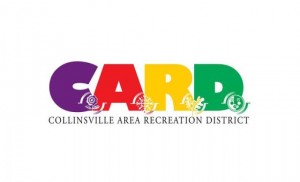The Collinsville City Council decided recently not to be a benefactor for the Collinsville Recreation District by donating nearly $2 million of land.
CARD passed a resolution on Sept. 16 asking the City to give the district much of the property at three parks and the Jaycee Sports Complex. Through a series of renewable agreements, CARD leases the property at no charge. CARD has the option to lease the land from the City with no lease payments until 2087.
 In a letter sent from City Manager Scott Williams to CARD Executive Director Susan Zaber, Williams indicated the City Council was not interested in ceding ownership of the land. The decision does not demonstrate a negative view of CARD, the letter said.
In a letter sent from City Manager Scott Williams to CARD Executive Director Susan Zaber, Williams indicated the City Council was not interested in ceding ownership of the land. The decision does not demonstrate a negative view of CARD, the letter said.
“The City Council views CARD as a valued partner in relationship to City Parks (sic) and is hopeful that our close working relationship will continue,” Williams’ letter indicated.
The City Council did not take a vote on the request, Williams said, because they unanimously opposed the request when he polled them individually. Zaber could not be reached for comment.
CARD Board of Commissioners President Patrick Collins said he was surprised the City did not at least discuss the request with CARD. The resolution asked for the City of Collinsville to enter into negotiations with CARD about the transfer of portions of property, and then to transfer the deeds.
No reason was given in the letter from Williams to Zaber. Collins said the Board has heard through an informal source that ceding land was not in the best interest of the City. The Board plans to contact Williams and/or Mayor John Miller to gather more information.
“I would like to know what they are thinking at this point,” Collins said.
Miller said it was not in the best interest of Collinsville residents to give up the land because the lease requires CARD to maintain the parks.
“That’s the only thing we have left to hold CARD accountable, as far as maintaining the land,” Miller said. “If we turn it over, we have no say in our parks. We don’t have much, but with owning the property, we might have an ace in the hole, you might say.”
If CARD owned much of the land it currently leases, it would increase its assets, which would translate to better rates on bonds if the district decides to issue bonds in the future to raise money, Collins said.
Miller said he did not understand why CARD would need to borrow money. The mayor cited the support by current CARD Board of Commissioners Mark Achenbach, David Tanzyus, Jeanne Lomax and Collins of a referendum that cut the district’s budget by as much as $200,000 or more each year.
“The board made the decision to cut their revenues without paying attention to what they needed. Now they are finding out that they don’t have the resources to do what they want,” Miller said. “That is not our problem, we didn’t create it. It shows that they aren’t necessarily responsible for what they are doing.”
Achenbach, who spearheaded the campaign for the referendum that capped tax levy rates in some operational funds, previously told The Metro Independent that he would never call the referendums a mistake. The district should be able to function within current limitations and provide the same level of service, Achenbach said.
The number of district employees has been reduced in the past two years, among other cost cutting moves. An attempt in June to outsource grass cutting at the parks was unsuccessful after the low bidder changed its bid amount before signing a contract. The Commissioners had estimated outsourcing the grass cutting would save the district $49,200. CARD commissioners have also put an emphasis on revenue generating services, such as weddings at Willoughby Farm.
At a recent CARD Board of Commissioners meeting, Achenbach stated multiple times that the district may have to consider borrowing more in its annual rollover bond than is needed to repay debt. Careful to stress that he was not advocating borrowing more money, which could raise taxes of district residents, Achenbach said the additional money would not be used on operations, but instead to build fund balances.
Councilman Mike Tognarelli, who has announced his intention to run for mayor in April, said he is also concerned with CARD finances.
“They are not in good fiscal condition. They may go off and borrow on that property,” Tognarelli said. “What happens if they can’t pay it back?”
Tognarelli said CARD’s management process has to be proven to him before he would consider such a gift. Zaber is CARD’s third director since Mark Badasch resigned in November 2011.
Rick Robbins served as the district’s interim director after Badasch’s resignation until Terry Wilson was hired in July 2012. Wilson resigned in March, citing his frustration with the Board of Commissioners – saying he saw a fundamental disconnected in management style and substance between himself and the board – as well as district finances.
“I firmly believe that the task of running this district would have been very difficult with the existing funding – but doable, and I was up to the challenge,” Wilson wrote in his resignation letter. “With the added burden of losing funding due to the passage of the referendums, running the district in the manner in which I believe the citizens deserve is impossible and sets the district up for failure.”
Zaber served as the interim director after Wilson’s resignation. She was appointed full-time executive director on July 15.
The City has previously provided financial assistance to CARD. In March 2013, the City Council voted to forgive $235,000 in debt after CARD chose to return the Miner’s Theatre to the Miner’s Institute Foundation. According to the lease agreed by CARD and the City in Sept. 1991, $70,250 in equipment was given to CARD at no cost.
When the Mississippi Valley Library District was created in 2004, the City transferred existing library land, including the Blum House, to the newly created district.
The City’s decision not to give the land to CARD does not change anything, Collins said.
“We’re still in the same position,” Collins said.
Although the CARD resolution indicated it was in the best financial interest of district residents to only add capital improvements to CARD owned land, and Zaber said a policy is in progress to restrict capital improvements to district-owned land, Collins said he would not advocate for the restriction.
“Speaking as only one board member, I can say that I will recommend capital improvements at all of the facilities,” Collins said.




Could article accurate and to the point